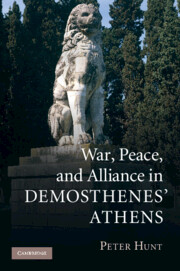Book contents
- Frontmatter
- Contents
- Acknowledgments
- Abbreviations, translations, and inscriptions
- 1 Introduction
- 2 Economics
- 3 Militarism
- 4 The unequal treatment of states
- 5 Household metaphors
- 6 Defense and attack
- 7 Calculations of interest
- 8 Reciprocity
- 9 Legalism
- 10 Peace
- 11 Conclusion
- Appendix 1 Speeches and texts
- Appendix 2 Plato and Aristotle on the causes of war
- Appendix 3 Claims of service
- References
- Index
9 - Legalism
Published online by Cambridge University Press: 05 May 2010
- Frontmatter
- Contents
- Acknowledgments
- Abbreviations, translations, and inscriptions
- 1 Introduction
- 2 Economics
- 3 Militarism
- 4 The unequal treatment of states
- 5 Household metaphors
- 6 Defense and attack
- 7 Calculations of interest
- 8 Reciprocity
- 9 Legalism
- 10 Peace
- 11 Conclusion
- Appendix 1 Speeches and texts
- Appendix 2 Plato and Aristotle on the causes of war
- Appendix 3 Claims of service
- References
- Index
Summary
The two most important twentieth-century movements to limit or eliminate war have been pacifism and the “peace through law” movement that gained strength in the early twentieth century and resulted in the League of Nations and then the United Nations. This chapter and the next do not aim to find an International Court of Justice of Greece, much less an Athenian Gandhi, but rather to examine two related issues: the extent to which the Athenians thought about the relationship between states as something that was, or should be, governed by law; what sorts of objections to war in general were voiced in Athens and how these differed from those common today.
Athens conceived of itself as a particularly lawful society. In the Clouds Aristophanes whimsically imagines a person objecting to a map of the world, because it does not show the jury courts in Athens; the whole play revolves around a man's attempt to escape from his debts by learning tricky arguments to use in court. The humorous premise of his Wasps is that an old man needs to be cured of his addiction to jury service. More seriously, in the Eumenides Aeschylus celebrates the law court's ability to put an end to cycles of vengeance. Evidence from the forensic speeches themselves confirms that the Athenians were proud of their system of law and especially of the fact that it resolved conflicts without violence.
- Type
- Chapter
- Information
- War, Peace, and Alliance in Demosthenes' Athens , pp. 215 - 236Publisher: Cambridge University PressPrint publication year: 2010



